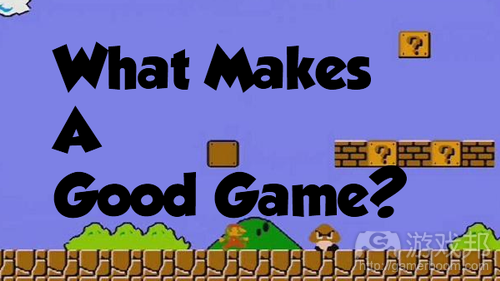列举好游戏应具备的10个要素
作者:Pete Collier
对游戏设计师们提出这个问题也许有些可笑吧。很大程度上是因为我们都认为但凡有点资历的设计师都应该能立即给出答案。但事实上,游戏设计是很含糊的,以上问题也没有明确的答案。找问题的答案无异于让果冻贴在墙上。所以可以理解为什么游戏设计师一听到这个问题就一脸黑线了。这主要是因为问题的答案需要他们把以往的所有经验浓缩成几个能形容如何做出让人们觉得有趣的东西的词语。换句话说,这是一个不可能的任务,但我倒是愿意挑战一下。以下是我总结出来的好游戏的特征:
沉浸感:
玩家应该关心玩游戏过程中游戏世界里发生的一切事情。好游戏会让玩家全神贯注于玩法上的微妙转换,以获得成功:
“我得注意,不然就输了。”
有意义的选择:
玩家在游戏过程中所做的选择应该影响游戏的结果。游戏对玩家行为的反应越大,玩家对游戏的沉浸感就越强。人们往往更注意他们能施加更大影响的东西。
“我和其他玩家所做的一切事情,都是重要的。”
目的:
人们喜欢有目的地做事,在游戏中也是一样的。玩家会提出这样的问题:为什么我要做这件事?为什么这件事是重要的?任何含糊都会让玩家玩游戏分心。好游戏应该提供明确的目标。人们不喜欢把时间和精力浪费在做一些得不到有意义的结果的事情上。
“我知道自己得做什么,并且我所做的事是重要的。”
深度:
不断为玩家提供可以学习的东西,无论是关于游戏、玩家自己或其他玩家的事。精通某个技能对玩家来说是一个很有吸引力的目标,因为这让他们觉得自己比别人有优势。好游戏是有深度的,总是让玩家有东西可以研究。
“玩这款游戏让我觉得自己很强大。”
易玩性:
永远不要让玩家感到不知所措。所谓游戏具有易玩性,就是总是让玩家觉得自己能够控制,无论他是新手还是行家。好游戏的复杂度体现在精通阶段,而不是让玩家一开始就感到困难。
“我觉得我是这款游戏的专家”。
反弹性:
这是一种积极的情绪:玩家玩完游戏后,强烈地感觉到自己下次玩一次可以表现得更好。这种感觉通常与希望马上再玩一次一起产生,和游戏的致瘾性大有关系。能刺激玩家产生这种感情的游戏应该是一款不得了的游戏。玩家不仅觉得自己积累了经验,而且觉得马上可以把经验付诸行动了。
“下一次一定会成功,因为我已经很熟悉了。”
玩家表达:
每个人生来都是独一无二的,游戏允许玩家展示个性和才能,以挖掘与生俱来的倾向,从而体现社会人价值。人们喜欢允许他们张扬个性的游戏。
“象棋大师肯定有非常强的逻辑思维。”
灵活性:
好游戏能适应玩家的各种游戏方式。平衡的机制形成自动调节的系统,总是让玩家感到体验不仅是有趣的,而且是独特的。
“游戏总是让我觉得有趣。”
价值:
好游戏以各种方式回馈玩家的投入,我说的投入当然不是钱,而是时间和努力。回报可以是有形的,但更多的是无形的;但都是让玩家觉得自己在游戏中有所收获。他们觉得玩游戏是值得的。
“这款游戏让我得到许多。”
我把“价值”放在最后一点,是因为我觉得它是最重要的。价值就是对玩家有用的东西。这听起来很了不得,但事实上,对人们有用的东西总是以各种形式出现,而不仅限于游戏,比如音乐、美术、电影、诗歌、人、戏剧、书籍、电视节目等,许多媒体都是有实用的,因为它们帮助人们找到自己的人生意义。它们精炼和提取信息、故事、情绪和教训,允许人们以有意义的方式丰富自己的人生经历。最终,这就是人们所追求的。各种媒体的存在意义就体现在它的这种功能中。作为游戏开发者,我们必须问自己的问题是,我们的游戏如何实现这个功能?它们对人类的实用性体现在哪里?我希望这篇文章能给思考“好游戏应该是什么样的?”的人一点小小的启发。
(本文为游戏邦/gamerboom.com编译,拒绝任何不保留版权的转载,如需转载请联系:游戏邦)
What Makes a Good Game?
by Pete Collier
This is a question which can instantly evoke a sense of dread in the game design fraternity. This is largely due to the assumption that any designer worth his/her salt should immediately know the answer and regale the inquisitor with definitive pearls of wisdom on the subject. But the truth is, there is something quite slippery about game design and no clear answer for the question above. In fact trying to do so could be compared to attempting to nail jelly to a wall. So understandably game designers can suddenly look a bit broken when asked the question. This is largely because it involves summoning every ounce of every experience they’ve ever had and distilling it down into a few choice words on how they try to make things fun for people. In other words it’s a bit of an impossible ask, but hey, I like a challenge so my very own distillations on what makes a good game are below:
Engagement – Players should care about everything that is happening during play. Great games demand attentiveness to the clear and subtle shifts in game-play to achieve success:
“I have to pay attention or I’ll lose”.
Meaningful Choices – The decisions that players make during play should affect the outcome of the game. The more this impact registers with the player/s, the greater the sense of attachment they’ll have to it. People tend to care more for things they’ve had a greater influence on.
“Everything that I and other players do, matters”.
Purpose – Everyone likes to feel they have a purpose and games are no different, players will ask questions like; why am I doing what I’m doing? Why is it important? Any confusion in this area will detract from the game experience. The best games have clear goals. People don’t like to feel that they’re having their time or effort wasted, having a clear and meaningful purpose alleviates this.
“I know what I have to do and it’s important”.
Depth – There should always be something more for players to learn, either about the game or themselves or indeed other players. Mastery of ones actions is a compelling proposition for people because it reveals a refined view of things that can give us advantage over others. Great games have plenty of depth that allow for players to demonstrate this.
“Playing this game gives me a sense of empowerment”.
Accessibility – Players should never feel overwhelmed. An accessible game will always make the player/s feel in control whether a beginner or an expert. The best games reveal complexity with mastery rather than front-loading a player from the start.
“I feel like an expert at this game”.
Bounceability – This denotes the positive feeling players get at the end of a game where they strongly feel they can do much better next time they play. This is often combined with immediately wanting to play again and is tied very closely with the qualities of addictiveness. Evoking this from a player is a very strong sign of an awesome game. Not only does the player feel like they’ve learned from the experience but critically they also feel it is instantly actionable.
“Next time will be different, I’ve got this sussed”.
Player Expression – Everyone is inherently unique, games that allow players to demonstrate individual expression, talent or flair tap into an innate human disposition to show societal value. People enjoy games that allow this to be demonstrated in an obvious way.
“That chess-master clearly has an incredibly logical mind”.
Flexibility – Fantastic games can accommodate multiple approaches and still deliver. Well balanced mechanics form a self regulating system that always give a fun experience that feels unique to the player/s.
“I always have a fun game”.
Value – The best games give players multiple returns on their investment and I don’t mean financially, I mean in time and effort. This can be tangible, but more often it’s intangible; either way players always feel like they’ve got something out of the game. They feel rewarded for playing.
“I’ve got so much use out of this game”.
That final point is where I’ll end because it is one of the most crucial. What has value to people is that which is useful to them. This sounds cold, but actually, what is useful to people comes in many guises as well as games. Great music, art, films, poetry, people, theatre, books, TV alongside many other mediums found across our collective cultures are all useful because they help people find meaning to their own lives. They refine and distill messages, stories, emotions and lessons, they allow people to frame their own life experience in a meaningful way. Ultimately, this is all that people are searching for. The joy of each medium is the way in which it does it. The question we have to ask ourselves as game developers is how do our games fulfill this function? How are they useful to people? I hope this article has gone a small way to explaining how the best ones do.(source:altdevblogaday)
http://www.altdevblogaday.com/2011/08/11/what-makes-a-good-game/








































 闽公网安备35020302001549号
闽公网安备35020302001549号